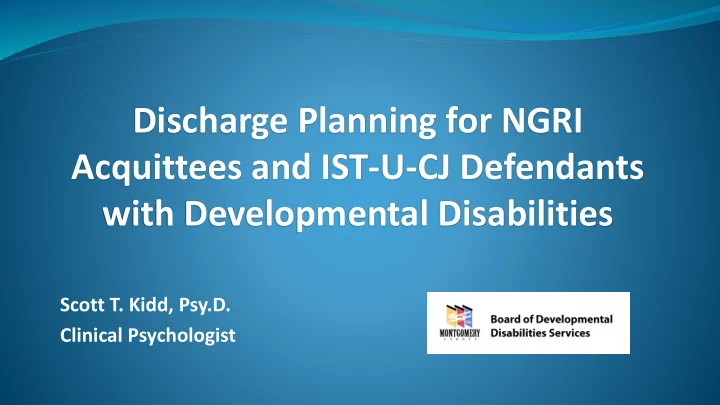

Discharge Planning for NGRI Acquittees and IST-U-CJ Defendants with Developmental Disabilities Scott T. Kidd, Psy.D. Clinical Psychologist
Learning Objectives Learn about services offered through County Boards of Developmental Disabilities (DD) for NGRI acquittees being discharged into the community Better understand challenges in residential placement and service provision for NGRI acquittees and IST-U-CJ defendants with DD Better understand challenges with managing risk of harm in the community for individuals with DD
Services for Eligible Individuals Case Management Employment Services - Linkage to community employment Coordination with adult day programming Housing coordination Recreation opportunities
Misconceptions Locked facilities and group homes Preventing people from leaving their homes Physical restraints
The Reality No locked residential settings (groups homes or developmental centers) Staff may prevent a client from leaving the home ONLY if they present an immediate risk of harm to themselves or others (e.g., running into traffic) Clients not physically restrained unless they present an immediate risk of harm to themselves or others and if less restrictive alternatives are exhausted
Discharge Planning To obtain County Board of DD Services: ▪ Must submit application for services ▪ Determination will be made whether the client has a developmental disability ▪ If qualifying diagnosis, then assessment conducted to determine functional limitations ▪ Each county independently determines eligibility for services
Challenges in Residential Placement and Service Provision Must have WILLING provider ▪ Residential and day program providers not required to provide services ▪ Providers may discontinue services with notice ▪ If no willing residential providers, then clients may be linked to local community resources Reasons for provider rejection : ▪ History of violence, sex offenses, arson
Challenges in Residential Placement and Service Provision Affordable housing in safe locations Finding a good match of housemates
Challenges in Residential Placement and Service Provision Individuals not required to accept County Board services (barring court order/conditional release) Limited access to mental health care in the community ▪ Concerns from providers about not being able to serve clients with below average intellectual functioning
Challenges in Residential Placement and Service Provision Systemic Issues In past, clients could be probated to Developmental Centers (DCs) - more staffing, programming Focus now on community placement; DCs downsizing/closing Low pay for direct care staff
Challenges in Residential Placement and Service Provision Systemic Issues Staff turnover limits relationship building between client and provider Inadequate collaboration between County Boards of DD and mental health providers
Challenges in Residential Placement and Service Provision ▪ Serving dangerous individuals Case-specific Issues with other clients who ▪ Supervision considerations are vulnerable ▪ Addressing risky behaviors ▪ Respecting individual rights ▪ Addressing idleness ▪ Providing dignity of risk
Recommend
More recommend